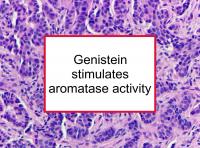A new study has reported that the soy isoflavone genistein can induce hormone receptor positive (ER+/PR+) breast cancer cell growth. In addition, genistein was found to increase breast cancer-specific aromatase activity (a process by which androgens are converted to estrogens) in such cells.
Estrogen-producing breast fibroblasts have important interactions with estrogen-dependent tumor cells. Fibroblasts are immature connective tissue cells. The fibroblast component of breast tissue is a primary nonglandular site of aromatase expression. Estrogen production catalyzed by aromatase in the breast is regulated differentially in normal compared to cancerous breast tissue. The use of aromatase inhibitors to block such estrogen production has been shown to be effective in treating estrogen-dependent tumors. However, a major problem with such treatment is the sudden onset of menopausal symptoms and other side effects that may cause women to seek relief with alternative medicines such as genistein.
In the study, the authors demonstrated that genistein can induce (ER+/PR+) human MCF-7 breast cancer cell growth. In addition, genistein was found to increase breast cancer-associated aromatase expression and activity in such cells. The authors previously developed an experimental breast cancer cellular model with a fully functional positive feedback loop between primary breast adipose fibroblasts and MCF-7 cancer cells . This represents a more natural laboratory model for breast cancer than human breast cancer cells alone. In this model, genistein was found to negate the growth inhibitory action of the aromatase inhibitor fadrozole (Afema, used in some non-U.S. countries to treat breast cancer) at physiologically relevant concentrations. The authors conclude that the results suggest that soy-based supplements might reduce the efficacy of breast cancer treatment with aromatase inhibitors.
Please see our articles on breast cancer diet during aromatase inhibitor treatment and genistein and daidzein for more information.
